National
Tom Gallagher, U.S. Foreign Service officer, dies at 77
Longtime LGBT rights advocate came out publicly in 1975
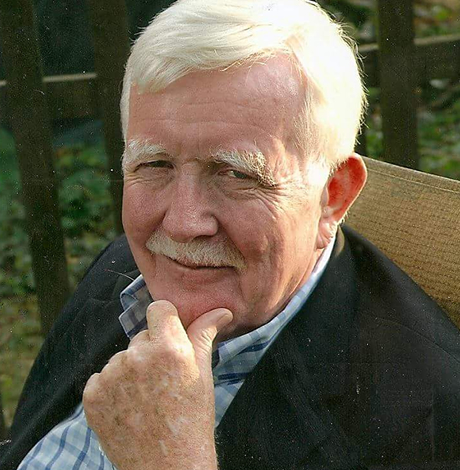
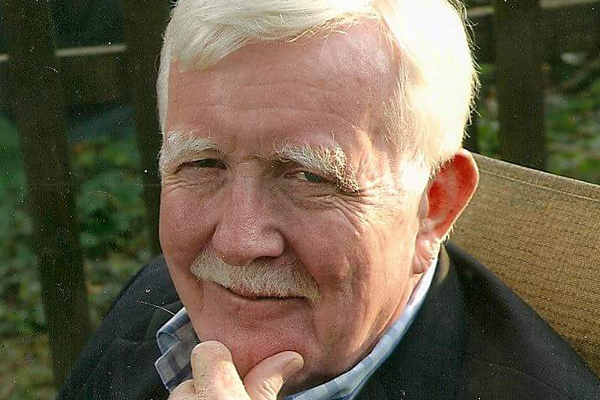
Tom Gallagher
Tom Gallagher, who became the first known U.S. Foreign Service officer to come out as gay in 1975 and who switched careers to become a social worker before returning to the Foreign Service in 1994, died July 8 in his hometown of Tinton Falls, N.J. from complications associated with a bacterial infection. He was 77.
In a write-up of his life and career that he prepared shortly before his passing and in an earlier interview published in the online publication Slate, he said he decided to disclose his sexual orientation at a 1975 conference in Washington, D.C., organized by the then Gay Activists Alliance called Gays and the Federal Government.
Knowing the disclosure would jeopardize his then 10-year career at the State Department and Foreign Service, he decided to come out because he became tired of having to conceal the truth of who he was, he recounted in the interview.
One year later, in 1976, after he determined longstanding policies making it difficult if not impossible for gays working in the Foreign Service to retain their required security clearances, he resigned and moved to California, where he began a new career as a social worker
His biographical write-up says he was born Sept. 11, 1940 in Manhattan before his family moved to New Jersey. He graduated from Holy Spirit School and Red Bank Catholic High School in Asbury Park, N.J. before entering New Jersey’s Monmouth University, where he received a bachelor’s degree in 1962.
Five days after graduating from Monmouth he signed up as a Peace Corps volunteer and entered the first Peace Corps group to go to Ethiopia, his biographical write-up says. After completing a Peace Corps training program at Georgetown University he and his group of volunteers were invited to the White House, where President John F. Kennedy and first lady Jacqueline Kennedy hosted a send-off tea party.
According to his write-up, upon their arrival in Addis Ababa, Ethiopia, the Peace Corps group was welcomed by Emperor Haile Selassie, the country’s monarch and leader. A month after arriving in the city of Agordot for his assignment to teach a seventh grade history class, Gallagher recounted he heard the “first shot” of what became the province of Eritrea’s protracted war of independence.
His write-up says he “remained devoted to Eritrea and its people for the rest of his life” and “sixty years after leaving the Peace Corps Tom was still in touch with 13 of the 80 boys he taught in Agordot.”
Upon returning to the U.S. he began his first full salaried job at the White House where he worked for President Lyndon Johnson’s War on Poverty program. It was at that time that he met Carolyn Worrell, the bright young woman also interested in foreign affairs whom he married a short time later.
In his Slate interview with freelance journalist Jacqui Shine he said he believed he was in love with Worrell at a time when he was struggling within himself to fight what he always knew deep inside himself – that he liked men. He had “fooled around with boys” since he was a teenager growing up on the New Jersey shore, he said in the interview.
Gallagher began his first stint in the Foreign Service in 1965, with his first overseas assignment sending him to Jidda, Saudi Arabia.
Subsequent assignments took him to Nigeria and Ecuador, where he served as acting U.S. Consul General in the city of Guayaquil, becoming, at age 34, the youngest ever chief of a major U.S. diplomatic mission. He later returned to Washington where he served in various positions at the State Department headquarters before coming out at the gay conference.
In 1970, shortly after completing his tour in Nigeria, he told his wife he wanted a divorce and arranged for the couple to stay together until Worrell found a job with a federal agency and got “settled,” he said in the Slate interview. It wasn’t until years later that he told his then ex-wife that the marriage breakup was due to his struggle with his sexual orientation, he said in the interview.
Meanwhile, after resigning from the Foreign Service in 1976 he moved to California and underwent training to become a social worker. A short time later he began work in the first of a number of positions, including a post as an emergency room social worker at UCLA Hospital in Los Angeles. He also volunteered as director of counseling programs at the Gay Community Services Center in LA.
Other positions he held included supervisor for the Travelers Aid Society in San Francisco; director of a Napa County, Calif., psychiatric emergency program; and as a volunteer for AIDS programs in the state.
In 1994, when President Bill Clinton removed policies preventing gays from working in the Foreign Service, Gallagher returned to his earlier career as a Foreign Service officer, his write up says. His first assignment was that of the position of American Consul at the U.S. Embassy in Madrid, Spain. While holding that post Gallagher helped raise $3 million for the Spanish AIDS Foundation.
Following his post in Spain he was appointed as Country Officer for Eritrea and Sudan in the State Department’s Office of East African Affairs. In 1999, he became head of the visa section at the U.S. Embassy in Brussels, where he was credited with refusing a visa for a radical Moroccan who was linked to a terrorist organization considering a plot to spray poison on a U.S. city, according to his biographical write-up.
The write-up says he next returned to Washington and worked at the State Department’s Office of Central African Affairs where he served as Country Officer for the Republic of the Congo. His final tour at the State Department was with the Office of International Health, where he served as Regional Advisor for Europe and worked on an international AIDS program.
After retiring in 2005, Gallagher continued to take on short tours for the State Department including assignments at 17 embassies and consulates on five continents, the write-up says. He also taught a course on the Middle East as an Adjunct Professor of Political Science at Monmouth University.
In 2012, during an event at the State Department celebrating the 20th anniversary of the State Department’s LGBT employee group, to which Gallagher was invited, then Secretary of State Hillary Clinton talked about Gallagher’s role in advocating for LGBT equality when he came out as a Foreign Service officer in 1975.
“I don’t want any of you who are a lot younger ever to take for granted what it took for people like Tom Gallagher to pave the way for all of you,” Clinton told the gathering. “It’s not a moment to be nostalgic,” she said. “It’s a moment for us to remember and to know that all of the employees who sacrificed their right to be who they are were really defending your rights and the rights and freedoms of others at home and abroad.”
Shine, who conducted the Slate interview, said she got to know Gallagher when she interviewed him for another story about three years ago.
“I was very fond of Tom, who was very funny, sweet, and a hell of a storyteller,” she told the Washington Blade. “He was as astonished as anyone by the extraordinary turns his life took, and humbled by and grateful for all he experienced.”
Gallagher is survived by his former wife, Carolyn Worrell, who is now a judge in Nevada; and his husband, Amin Dulgumoni, a senior software engineer at Goldman Sachs.
Plans for a memorial were expected to be announced soon.
National
GLSEN hosts Respect Awards with Billy Porter, Peppermint
Annual event aims to ‘inspire a lot of people to get active’

GLSEN will host its annual Respect Awards April 29 in New York, with guests including Miss Peppermint and Billy Porter.
Respect Awards director Michael Chavez said that the event will be moving.
“It will inspire a lot of people to get active and take action in their own communities and see how much more work there is to do, especially with all of the harmful things happening,” he said.
At the event, they will recognize the Student Advocate of the Year, Sophia T. Annually, GLSEN recognizes a student from around the country who is impacting their community.
“Sophia is doing incredible work advocating for inclusive sex education that is LGBTQ+ affirming, working with Johns Hopkins University to implement curriculum.” Chavez said.
Chavez calls the students that attend the Respect Awards the “biggest celebrities” of the evening.
“It is really important for the adults, both the allies and the queer folks, to hear directly from these queer youth about what it’s like to be in school today as a queer person,” he said.
GLSEN is a queer youth advocacy organization that has been working for more than 30 years to protect LGBTQ youth.
“GLSEN is all hands on deck right now, because our kids are under direct attack and have been for years now,” said actor Wilson Cruz.
Cruz is the chair of GLSEN’s National Board, which works to fundraise and strategize for the organization.
“I think we are fundamental to the education of LGBTQ students in school,” he said. “We advocate for more comprehensive support at the local, national, and federal levels so our students are supported.”
Chavez is one of the students that was impacted by this work. He led his school’s GSA organization and worked with GLSEN throughout his youth.
Cruz said Chavez is doing what he hopes today’s GLSEN students do in the future, which is pay the work forward.
“There’s nothing more powerful than people who have experienced the work that GLSEN does and then coming back and allowing us to expand on that work with each generation that comes forward,” he said.
Florida
Homeless transgender woman murdered in Miami Beach
Andrea Doria Dos Passos attacked while she slept
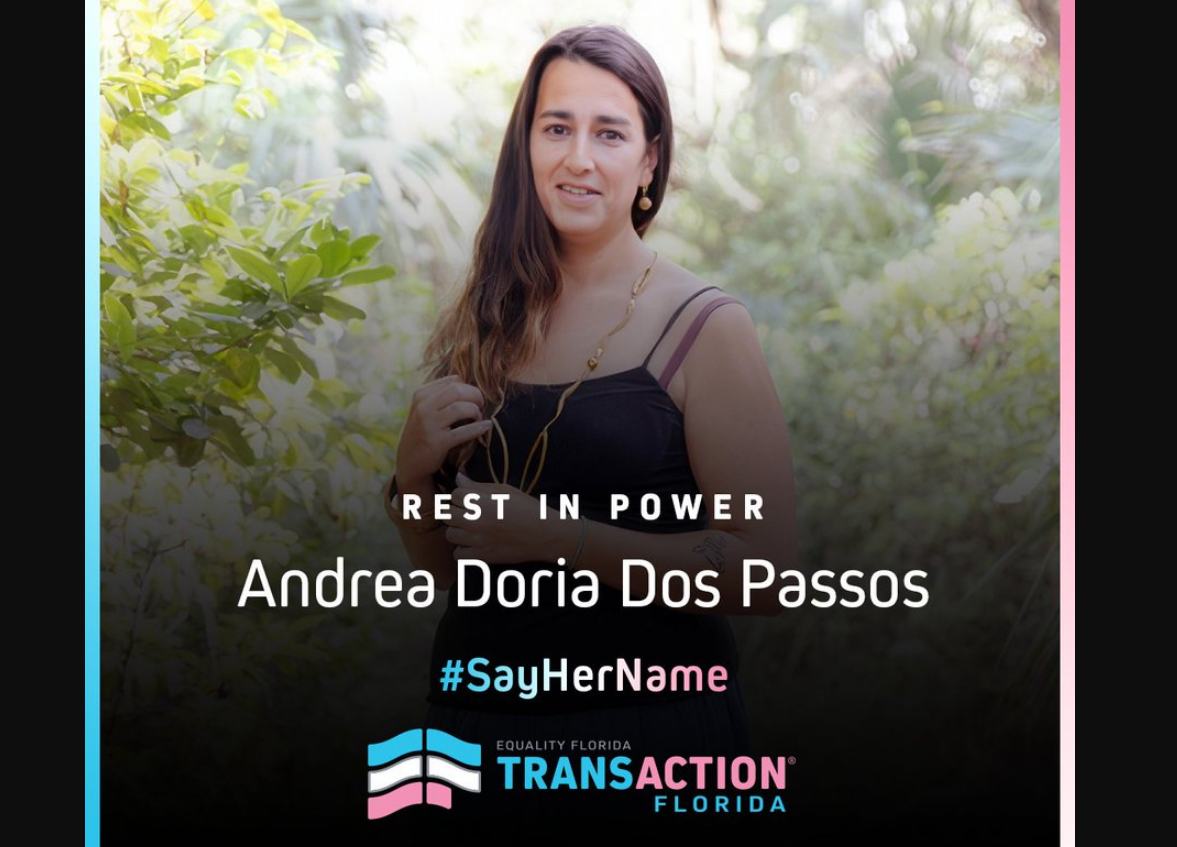
Gregory Fitzgerald Gibert, 53, who was out on probation, is charged with the second-degree murder of 37-year-old Andrea Doria Dos Passos, a transgender Latina woman who was found deceased in front of the Miami Ballet company facility by a security guard this past week.
According to a Miami Beach Police spokesperson the security guard thought Dos Passos was sleeping in the entranceway around 6:45 a.m. on April 23 and when he went to wake her he discovered the blood and her injuries and alerted 911.
She was deceased from massive trauma to her face and head. According to Miami Beach police when video surveillance footage was reviewed, it showed Dos Passos lying down in the entranceway apparently asleep. WFOR reported: In the early morning hours, a man arrived, looked around, and spotted her. Police said the man was dressed in a black shirt, red shorts, and red shoes.
At one point, he walked away, picked up a metal pipe from the ground, and then returned. After looking around, he sat on a bench near Dos Passos. After a while, he got up and repeatedly hit her in the head and face while she was sleeping, according to police.
“The male is then seen standing over her, striking her, and then manipulating her body. The male then walks away and places the pipe inside a nearby trash can (the pipe was found and recovered in the same trash can),” according to the arrest report.
Police noted that in addition to trauma on her face and head, two wooden sticks were lodged in her nostrils and there was a puncture wound in her chest.
Victor Van Gilst, Dos Passos’s stepfather confirmed she was trans and experiencing homelessness.
“She had no chance to defend herself whatsoever. I don’t know if this was a hate crime since she was transgender or if she had some sort of interaction with this person because he might have been homeless as well. The detective could not say if she was attacked because she was transgender,” said Van Gilst.
“She has been struggling with mental health issues for a long time, going back to when she was in her early 20s. We did everything we could to help her. My wife is devastated. For her, this is like a nightmare that turned into reality. Andrea moved around a lot and even lived in California for a while. She was sadly homeless. I feel the system let her down. She was a good person,” he added.
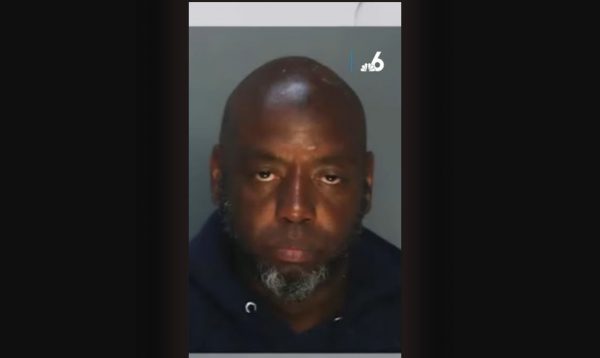
The Miami Police Department arrested Gibert, collected his clothing, noting the red shorts were the same type in the video and had blood on them. Blood was also found on his shoes, according to police. He was taken into custody and charged.
“The suspect has an extensive criminal record and reportedly was recently released from custody on probation for prior criminal charges. Police apprehended the suspect in the city of Miami and the investigation is currently ongoing. This case is further evidence that individuals need to be held accountable for prior violent crimes for the protection of the public. We offer our sincere condolences to the family and friends of the victim,” Miami Beach Mayor Steve Meiner said in a statement.
Joe Saunders, senior political director with LGBTQ rights group Equality Florida, told the Miami Herald that “whenever a transgender person is murdered, especially when it is with such brutality, the question should be asked about whether or not this was a hate-motivated crime.”
Federal Government
HHS reverses Trump-era anti-LGBTQ rule
Section 1557 of the Affordable Care Act now protects LGBTQ people
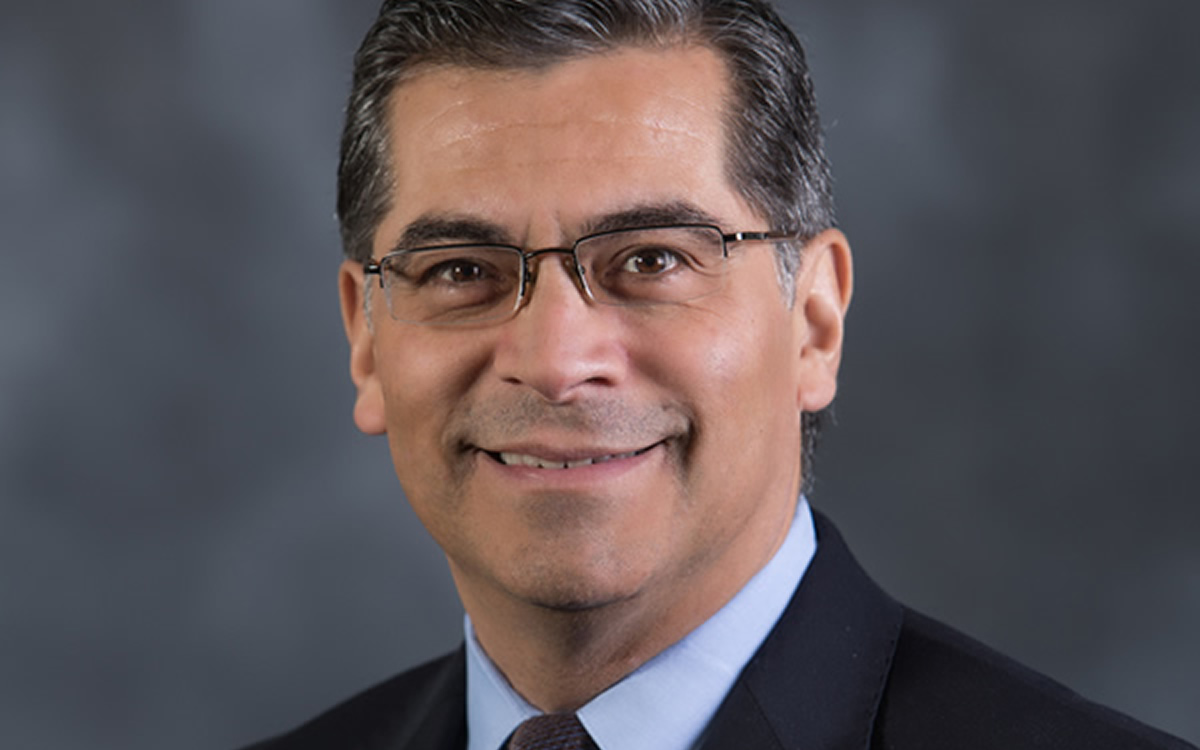
The U.S. Department of Health and Human Services Office for Civil Rights has issued a final rule on Friday under Section 1557 of the Affordable Care Act advancing protections against discrimination in health care prohibiting discrimination on the basis of race, color, national origin, age, disability, or sex (including pregnancy, sexual orientation, gender identity, and sex characteristics), in covered health programs or activities.
The updated rule does not force medical professionals to provide certain types of health care, but rather ensures nondiscrimination protections so that providers cannot turn away patients based on individual characteristics such as being lesbian, gay, bisexual, transgender, queer, intersex, or pregnant.
“This rule ensures that people nationwide can access health care free from discrimination,” said HHS Secretary Xavier Becerra. “Standing with communities in need is critical, particularly given increased attacks on women, trans youth, and health care providers. Health care should be a right not dependent on looks, location, love, language, or the type of care someone needs.”
The new rule restores and clarifies important regulatory protections for LGBTQ people and other vulnerable populations under Section 1557, also known as the health care nondiscrimination law, that were previously rescinded by the Trump administration.
“Healthcare is a fundamental human right. The rule released today restores critical regulatory nondiscrimination protections for those who need them most and ensures a legally proper reading of the Affordable Care Act’s healthcare nondiscrimination law,” said Omar Gonzalez-Pagan, counsel and health care strategist for Lambda Legal.
“The Biden administration today reversed the harmful, discriminatory, and unlawful effort by the previous administration to eliminate critical regulatory protections for LGBTQ+ people and other vulnerable populations, such as people with limited English proficiency, by carving them out from the rule and limiting the scope of entities to which the rule applied,” Gonzalez-Pagan added. “The rule released today has reinstated many of these important protections, as well as clarifying the broad, intended scope of the rule to cover all health programs and activities and health insurers receiving federal funds. While we evaluate the new rule in detail, it is important to highlight that this rule will help members of the LGBTQ+ community — especially transgender people, non-English speakers, immigrants, people of color, and people living with disabilities — to access the care they need and deserve, saving lives and making sure healthcare professionals serve patients with essential care no matter who they are.”
In addition to rescinding critical regulatory protections for LGBTQ people, the Trump administration’s rule also limited the remedies available to people who face health disparities, limited access to health care for people with Limited English Proficiency, and dramatically reduced the number of healthcare entities and health plans subject to the rule.
Lambda Legal, along with a broad coalition of LGBTQ advocacy groups, filed a lawsuit challenging the Trump administration rule, Whitman-Walker Clinic v. HHS, and secured a preliminary injunction preventing key aspects of the Trump rule from taking effect.
These included the elimination of regulatory protections for LGBTQ people and the unlawful expansion of religious exemptions, which the new rule corrects. The preliminary injunction in Whitman-Walker Clinic v. HHS remains in place. Any next steps in the case will be determined at a later time, after a fulsome review of the new rule.
GLAAD President Sarah Kate Ellis released the following statement in response to the news:
“The Biden administration’s updates to rules regarding Section 1557 of the ACA will ensure that no one who is LGBTQI or pregnant can face discrimination in accessing essential health care. This reversal of Trump-era discriminatory rules that sought to single out Americans based on who they are and make it difficult or impossible for them to access necessary medical care will have a direct, positive impact on the day to day lives of millions of people. Today’s move marks the 334th action from the Biden-Harris White House in support of LGBTQ people. Health care is a human right that should be accessible to all Americans equally without unfair and discriminatory restrictions. LGBTQ Americans are grateful for this step forward to combat discrimination in health care so no one is barred from lifesaving treatment.”
-

 District of Columbia4 days ago
District of Columbia4 days agoCatching up with the asexuals and aromantics of D.C.
-

 South America4 days ago
South America4 days agoArgentina government dismisses transgender public sector employees
-

 Mexico3 days ago
Mexico3 days agoMexican Senate approves bill to ban conversion therapy
-

 Advice3 days ago
Advice3 days agoShould I divorce my husband for the hot new guy in our building?












